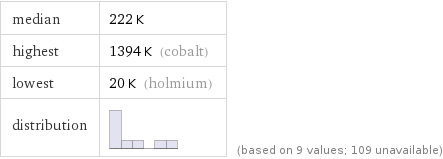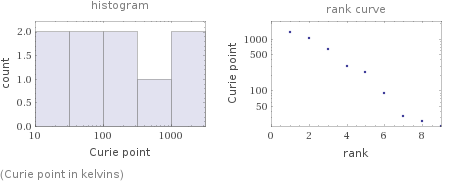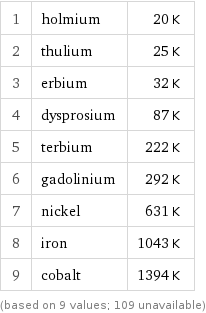Input interpretation

elements | Curie point
Summary

median | 222 K highest | 1394 K (cobalt) lowest | 20 K (holmium) distribution | | (based on 9 values; 109 unavailable)
Entities with missing values

hydrogen | helium | lithium | beryllium | boron | carbon | nitrogen | oxygen | fluorine | neon | ... (total: 109)
Distribution plots

(Curie point in kelvins)
Curie point rankings

1 | holmium | 20 K 2 | thulium | 25 K 3 | erbium | 32 K 4 | dysprosium | 87 K 5 | terbium | 222 K 6 | gadolinium | 292 K 7 | nickel | 631 K 8 | iron | 1043 K 9 | cobalt | 1394 K (based on 9 values; 109 unavailable)
Unit conversions for median Curie point 222 K

-51 °C (degrees Celsius)

-60 °F (degrees Fahrenheit)

400 °R (degrees Rankine)

-41 °Ré (degrees Réaumur)

-19 °Rø (degrees Rømer)
Comparison for median Curie point 222 K

33 K below temperature of the ice/salt mixture defining the zero point of the Fahrenheit temperature scale (0 °F)

27 K above boiling point of dry ice-acetone slurry (-78 °C)

27 K above sublimation temperature of dry ice (carbon dioxide) (194.6 K)
Corresponding quantities

Thermodynamic energy E from E = kT: | 19 meV (millielectronvolts)

Blackbody energy flux Φ from Φ = σT^4: | 138 W/m^2 (watts per square meter)

Approximate luminous exitance from a planar blackbody radiator perpendicular to its surface: | 2.8×10^-31 lx (lux)